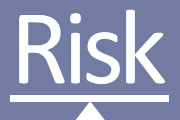|
In some of my executive education work, I help emerging leaders switch from "base case only" planning to creating and considering scenarios. For those with HBR access, here is an interesting case example of that type of thinking in action, at Lego. Personally, I'm not convinced forcing a 2-dimensional scenario framework is helpful -- crafting 4-5 compelling scenarios with multi-factor narratives behind them is less constraining -- but the overall case example is quite illustrative.
HBR Lego Group: Envisioning Risks in Asia (A) In an HBR blog post, Laura Liswood quotes research by Prof. Aaron Dhir on how increasing the number of women changes corporate Board dynamics. Independent of the gender dimension, it's interesting that the core themes identified all relate to improved treatment of risk and uncertainty, better bridging the gap between Kahneman's System 1 and System 2. The themes are:
Co-presenting a GARP webcast on the above topic with Brenda Boultwood (MetricStream; former CRO, Constellation Energy) on Nov. 18. Continuing education credit available.
UPDATE Dec 3: The webcast is available for streaming for the next several months at the GARP site. Registration is required for access. Once again at the Cambridge Cetre for Risk Studies Annual Conference, in my opinion regularly the most thoughtful and idea-filled cross-sector risk conference out there. This year, fascinating and a bit sad to see how everyone recognizes how stress testing needs to be more strategic, better genuinely integrated into decisionmaking. But very few have the time/energy to try to make it happen. Conference blow-by-blow on Twitter #camrisk2015 (including my own attempts to become a Twitterer)
Varied and enthusiastic crowd yesterday at Rotman for my talk on ERM across sectors.
A video of the presentation is available at the Rotman media browser and the slides (which are puny in the video) can be downloaded here: 20150601 Pergler ERM Rotman.pdf. In addition, Rotman have posted a short excerpt on YouTube, though the editor somehow chose only a clip about financial services, which was actually only a minor part of the talk. Presenting on this topic at the Rotman (University of Toronto) Master of Finance Speaker Series, 5:30pm June 1.
CFA CE credit eligible. Presenting as invited speaker on the above topic at the 3rd Kuwait ERM conference on March 30. Very important topic -- in my opinion stress testing is a crucial but still not very systematically discussed topic in the nonfinancial sector. And the interplay of "business as usual" risk modeling (e.g. cash flow at risk models), scenarios, and stress testing is an important part of framing robust risk management.
Update Apr 8, 2015: Presentation is available for download at the conference site Interesting commentary on varying volatility, economic regime change, and confidence in scenarios.
Amplifies my belief that scenarios (for important foundational unknowns, potential regime changes, and stress testing) and probabilistic modeling for business-as-usual risks can and need to coexist for good risk-informed decisionmaking. And it's a cool title to boot. Rhys Bidder: Animal spirits and business cycles Risk management is a shared responsibility of everyone in a company, not the exclusive domain of risk managers.
What can treasurers in particular do to improve overall risk management, beyond pure treasury risks? Continuing my collaboration with the AFP, I am part of a panel speaking on this topic this Thursday (Feb 12) in an AFP webinar, "How can Treasury lead ERM?" For a similar perspective on the role of the CFO, rather than the Treasurer, see my working paper (with Will Liu), Role of the CFO in risk management. There are both commonalities as well as specificities by role (and of course my thinking has evolved in the intervening 2 years...) A presentation I made at the AFP (Association of Financial Professionals) Executive Institute in Washington DC this past November has been quoted/excerpted in Crisis Management: The First 72 Hours (gtnews.com). The presentation was with my friend and colleague Becca O'Brien, a crisis expert with extensive public and private sector experience, and included an exciting crisis simulation developed by McKinsey.
Of course, crisis response and resilience is only part of the story. Equally important is crisis preparedness, and (as much as possible) crisis avoidance through effective risk management. That's a topic for another day. |
Martin PerglerPrincipal, Balanced Risk Strategies, Ltd.. Archives
February 2023
Categories |
Copyright © 2014-2020, Balanced Risk Strategies, Ltd. – Contact us


 RSS Feed
RSS Feed